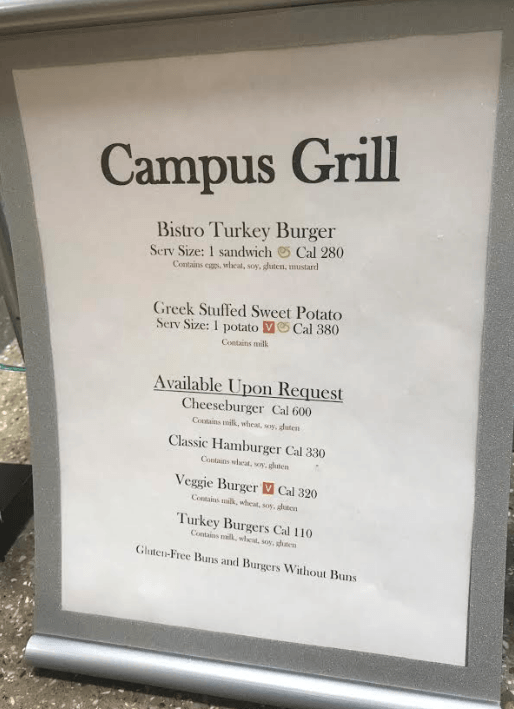Calorie information at dining hall follows federal regulations but could be triggering
3 min read
Finnley Goff | The Blue & Gray Press
By KATE SELTZER
Staff Writer
Nationwide, eating disorders such as anorexia, bulimia and binge eating are on the rise. Women and adolescents age 18-21 are especially susceptible to developing symptoms of such disorders. This makes college students, and female college students in particular, a disproportionately affected group.
According to the Multi-Service Eating Disorders Association (MEDA), 15 percent of women age 17-24 have eating disorders, as do 20 percent of college students. For college students who are new to living away from home and making their own food choices, deciding what to eat and how to be healthy can be overwhelming.
The stress of a new environment combined with the pressure to achieve a perfect body image can make it tempting to exert control over one aspect of collegiate life by restricting calorie intake. While this can be a useful tool for monitoring the healthiness (or unhealthiness) of foods, it can be dangerous when taken to the extreme. Excessive calorie counting can be symptomatic of an eating disorder. Given the prevalence of eating disorders on college campuses, why include a mechanism in the UC that makes them easier to develop? As it turns out, there are a couple of compelling reasons for this practice.
Rose Benedict, Marketing Manager with University Dining at UMW, said that the decision to label all food options in the UC with calorie information is the result of new federal regulations. “The basic premise is that this information needs to be available to the consumer so they can make informed decisions,” she said.
The new regulations were supposed to go into effect this fall, but the deadline has since been pushed back to May of 2018. “Everything is out there ahead of the deadline because there is a lot of preparatory work that goes into preparing menu signs and identifiers displaying this information,” said Benedict.
Beth Winthrop is the Senior Manager of Operational Support and National Registered Dietitian for Sodexo, the food provider for many universities’ dining halls including the UC. She said that the new FDA legislation is quite specific. “Calories are basically supposed to be shown as largely and clearly as prices. We brought ourselves into compliance with FDA regulations, but at the very last moment they did another year extension.”
Winthrop argues that in addition to obeying the law, labeling calories is a useful tool for students to maintain their health. “Statistically, a combination of showing the caloric value as well as a qualitative icon, like the Mindful icon, was shown to drive the most behavior change in terms of selecting a healthier choice. I do think that showing some of those calories that can be appalling can be sort of a wake up call for people.”
In an article for Her Campus, Registered Dietitian Heidi Pflugrath said, “Calories can be a useful tool. But it is important to understand that they are just that: a measurement tool, like inches or ounces.” Both Benedict and Winthrop pointed to the Mindful program as an alternative to healthy eating without necessarily counting calories.
“If anyone wants to be eating more healthy at the top of the UC, look for the green apple shaped heart,” said Benedict. Winthrop agreed, saying “I think it’s a more positive approach to urge people to eat more veggies, fruit, whole grains, [and] whole foods in general.” She said that although the Mindful program “is based on some pretty significant science,” Sodexo is focused on marketing healthier options as “attractive and delicious.”
Although monitoring calorie intake can be an effective way of maintaining health, it is important to avoid restricting it so much that you are not receiving the nutrition your body and mind need to function. Students should be on the lookout for obsessive calorie counting as a sign of a potentially developing eating disorders and in general should take into account a qualitative approach to nutrition.











